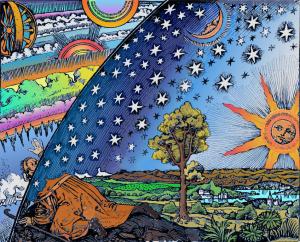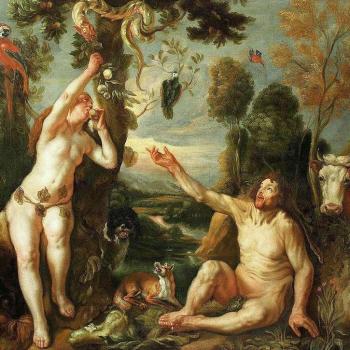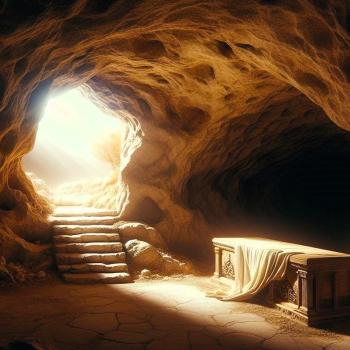Welcome to the inaugural post of Disputed Questions on Patheos! If you’ve ever wondered if God exists… or how we can know that the events described in the New Testament actually happened… or what possible evidence there could be for life after death… then this is the place for you. We explore the key philosophical questions that underlie religious belief, ethics, politics, even sports (Yes, there are philosophical disputes in sports!)
I’ve been writing this column for many years, on many different topics and in different venues. (I chose the title “Disputed Questions” after one of my favorite books by the Trappist monk Thomas Merton, and for its connections to Thomas Aquinas’s famous Quaestiones Disputatae de Veritate.)
For Patheos, however, I plan on concentrating on the philosophical issues that arise in religion and, occasionally, politics and ethics. This is sometimes given the lofty sounding name of “Philosophy of Religion.”
It basically means figuring out the core ideas behind a religious (or sometimes political) dispute and trying to “adjudicate” or settle them without recourse to authority but on the basis of evidence and standards that everyone can agree on.
What are Disputed Questions?
According to Stanford University at least, philosophy of religion is “the philosophical examination of the themes and concepts involved in religious traditions.” It involves philosophical reflection on God, the meaning of religious belief, whether there are such a thing as “moral facts,” the nature and reliability of testimony, and many similar topics.
It’s a fascinating field because it brings the conceptual clarity and logical rigor of philosophy to bear on subjects people are actually interested in, such as life after death and how we should live.
My background is in both Philosophy and Theology, although I don’t pretend to be an expert in either but only a fellow seeker.
I initially studied Philosophy at a Jesuit university, concentrating on the classics and in phenomenology and existentialism. After college, I moved to Israel to learn Hebrew, doing a series of ulpanim or intensive six-month Hebrew language courses, first at a kibbutz in the Jezreel Valley and then in a small village on the Mediterranean just south of Haifa. Israel was, for me, a spiritual transformation that impacted my entire life.

Disputed Questions and the Bible
When I returned to America, I spent eight years studying the New Testament in an evangelical seminary, where a number of philosophical issues came up – about what we can and cannot know about ancient texts, the sources of Christian faith, and so on. I wrote a couple of books about what I learned studying the New Testament in the original languages (Greek and Aramaic) and the problems involved in that.
Now, after all that, I’m coming full circle and am currently pursuing graduate studies in Europe in the Philosophy of Religion, at another Jesuit university.
What this means is that I approach questions from a (Catholic) philosophical standpoint but with an eye on the Bible and how people actually live, which, I am happy to say, is how many philosophers have conducted themselves over the centuries.
The Bible (and, for Catholics, the teaching of the Church) is a nice counterbalance that keeps everyone firmly on planet earth, lest our philosophizing gets a little too airy and we find ourselves floating off into space.
That doesn’t mean we can “prooftext” our way out of philosophical problems or dilemmas. As we’ll see in the coming weeks, a Biblical text can often deepen a question, or further complicate it, without necessarily solving it.
Philosophy Means Trading Easy Questions for Hard Ones
When we look at the problem of life after death, for example, how to make sense of bodily resurrection – if God recreates our body is it really our body brought to life or merely a replica, a clone, and therefore is it “we” who are raised or someone else? – that will really be clear. Although the goal of Philosophy of Religion is to discover “answers,” often we are only left with problems and even more questions. As the old joke has it, philosophy just means trading smaller problems for bigger ones, easy questions for harder ones.
As for the format, I tend to write about whatever is on my mind – from my own studies, the news, current political and ethical disputes, questions from my adult children, arguments with my wife, my travels, and so on. This means that one week I’ll be writing about the ethics of abortion and the next week about the rise of populism in western Europe.
Culturally or politically, I’m a fairly traditional Catholic with a willingness to discuss pretty much anything with anybody – Zen Buddhists, Russian nationalists, even, God forbid, Democrats. All I ask for in conversations is civility, a sense of humor and, if possible, mental clarity.
Feel free to contact me here if you have any question you’d like to see addressed or a rant you’d like to share. I answer all emails. My most reliable email address is: robert@roberthutchinson.com.

Robert J. Hutchinson is an award-winning Catholic writer and the author of numerous books of popular history, including Searching for Jesus: New Discoveries in the Quest for Jesus of Nazareth (Thomas Nelson), The Dawn of Christianity (Thomas Nelson), The Politically Incorrect Guide to the Bible (Regnery) and When in Rome: A Journal of Life in Vatican City (Doubleday). Born and raised in the Pacific Northwest, he attended Catholic schools, studied philosophy at a Jesuit university, moved to Israel to learn Hebrew, and then earned a degree in New Testament studies. Hutchinson is currently pursuing graduate studies in the Philosophy of Religion in Europe and writes for many publications. You can read more about the author at www.RobertHutchinson.com.















